LGBTlife – Rachel Mathews-McKay LGBT + Trade Unions.
Rachel Mathews-McKay is a founder member of SIPTU’s LGBTQ Network and a prominent activist on the Irish scene. She joins Mick FitzGerald to discuss the relationship between the Trade Union…
Daily Archives: February 24, 2015
CNN Commentator Sally Kohn: I Hope My Kid Is Gay
CNN Commentator Sally Kohn: I Hope My Kid Is Gay
Writing in the Washington Post, Kohn says a gay child can be just as happy and fulfilled as a straight one.
Neal Broverman
www.advocate.com/families/2015/02/24/cnn-commentator-sally-kohn-i-hope-my-kid-gay
A Conversation With Michael Sam
A Conversation With Michael Sam
Michael Sam, famously, is the first openly gay man ever drafted by the NFL, a fact that often can obscure the man behind the statistic. He has been held up as a role model, as an example of what gay can look like, as an icon, and as an example of how far queer folk have yet to go in gaining acceptance in certain areas of society. While many articles have detailed Michael Sam’s story and have described and determined his importance to the gay community at large, I was most interested in gaining another perspective: Michael Sam’s perspective on Michael Sam. Sam was in St. Louis to give the keynote speech at an event organized to raise awareness about HIV and AIDS in the Black community as part of National Black HIV and AIDS Awareness Day, and he was kind enough to agree to answer a few questions. We sat down in a little corner, and after he’d retrieved his phone, I told him that my interest was in finding out how he sees himself and his place within the gay community and what he thinks his place is within the Black queer community.
Maurice Tracy: I read a lot about you, and it is usually, honestly, [a lot] about football and [your place in the] gay community at large, but I wanted to know about how you see yourself, especially as a Black gay man. How do you see your position in Black gay culture and the Black gay community?
Michael Sam: [W]hen I first came out, I didn’t see myself as a role model or an activist or an advocate or anything; I liked to think of myself as a football player, as a guy who just tried to chase a dream and achieve his goals, and that’s how I saw myself at first. Now, by being in the spotlight, I think my role [has] become more [about] trying to help others, whether it is being in the Black community or the Black gay community or LGBT community. [I want] to help others and have people understand that it is OK to be who you are and to tell the truth. Does that answer your question?
MT: Yeah. Think of it more as a conversation. Imagine we are in a coffee house having a kiki. [Michael frowns in confusion.] Do you know what “kiki” means?
MS: Kinky?
MT: [Laughs.] “Kiki,” not “kinky”! A kiki is Black gay slang for basically “shooting the shit,” just talking [with your friends].
MS: All right.
MT: Do you have a lot of Black gay friends, or are most of your Black friends straight because of sports, or white gay friends or, well–
MS: So I have a few gay friends. My best African-American/Black gay friend is transgender. I met her at Mizzou; she helped us in a dinner. So, uh, I don’t have a lot of gay friends. I have a lot of straight friends, which we joke around sometimes, and people will try to call me “straight-acting,” like I’m a “straight-acting gay,” and I am like, “No, I am not ‘straight-acting.’ This is who I am. I’m gay. [Same for] people who [are] more feminine; that’s just who they are.” … I’d say I have more straight friends than gay friends.
MT: It is probably because of sports. I remember when my brothers played sports, your team becomes your family, and you spend most of your time with them. I used to get jealous over that. But when you talk about femininity and masculinity — and I too hate the phrase “straight-acting” — but how much do you think your “masculinity” has shaped what your narrative?
MS: Can you rephrase the question?
MT: So do you think you would be received as well as you are received if you weren’t so “masculine”?
MS: If I was more feminine?
MT: Yeah.
MS: So I think it would be either way. People would still judge me. [Some] would hate me even more, but it is hard to discuss that, because this is who I am. I think that it doesn’t matter if I was masculine or feminine, because the haters are still going to hate because I am gay.
MT: I guess. Also your narrative in general — how [much of it has been in your control]?
MS: I think I have handled it right and the best way … people always want to see you fall, but there hasn’t been an incident all year. I haven’t done anything; I have handled myself in the right way. People thought I would be a distraction. I didn’t make myself a distraction; the media made me a distraction.
MT: Expanding on [your relationship with the public and the media], does it ever throw you that you have a Wikipedia page entry now? Like, you will never just be Michael — Mike — Sam; you’ll never be Mikey. You will always be “Mike Sam, the first….” Is that a lot of pressure?
MS: It’s not a lot of pressure. I can only control what I can control. And when you say that bio thing, a lot of people want to know if all that went to my head. No [because] I love what I’m doing: helping others. But still … I could do a lot more than I am doing now if I continue on playing. So I am really banking on me playing so I can help people more, even though there may be a lot of [negativity] because they don’t accept it, but when they get to know me, because that is how you change people. People are just like, “Oh, he’s gay,” but get to know me, because then they’ll be like, “He’s just another human being.”
MT: So do you actually follow the comments or criticisms people have said about you or what you represent?
MS: I try not to. I may see that first one. It doesn’t hurt my feelings. I am from Texas, and you just treat people with respect.
MT: I am thinking about the conversations that surround people like you, Derrick Gordon, and others, conversations that center around the perception that, when Black gay folk come out, they always seem to have or get white partners.
MS: Yes, I have gotten criticism from the Black gay community for dating Vito. The thing is, if you know anything about Mizzou, it is [pre]dominantly white. We are a small group of Black people that are there. Now the Black people can hang out together, but athletes, [we are kept] separate. The only Black friends I really had were my teammates and people in the athletic department. There are not a lot of openly gay athletes. and most of them are on the swimming or the softball team. So when I start dating someone [openly] gay within the athletic department, that person [happens] to be white Italian. If you fall in love with that person, I think it is unfair to judge me because I’m dating a white guy. I love this person; why would I stop that and go looking for something I already have? Also [at the time I was] still closeted. What if I try to find someone outside the athletic department and they take picture and tweet it and it gets out and I’m not ready? So I think it is unfair to judge me and you don’t know the whole story.
MT: OK, I got a bit of that from the Oprah interview, and it kind of makes sense. But OK, my last question, because they are hovering, is inspired by Joseph Beam’s brilliant essay “Brother to Brother.” In it he talks about Black men loving Black men being a revolutionary act. Some have debated whether he means this in a romantic sense or just a communal sense. But do you feel a sense of responsibility or greater obligation to Black gay men? Do you consider yourself your brother’s keeper?
MS: [For] me it’s 2015. It’s a whole new generation. I don’t see Black or white. I see the person.
* * *
I must confess that when I began the interview, I expected to encounter a polished celebrity, a man hyperaware of his image, but the man I encountered was someone altogether different. There was a moment after his keynote speech, during the Q-and-A portion event, when a woman told him that she was childless but would be honored to think of him as her son. Another woman simply wanted to wrap her arms around him and give him that “home embrace,” the type of embrace I have only known from the arms of Black women. I understand why they would do such a thing. Michael Sam is a man who is incredibly kind and earnest, one who connects his potential profession with the ability to make a difference for others. It is no wonder that a room filled with people would collectively tell him that he should consider himself a part of an extended queer family that loves him.
A version of this interview originally appeared on The Vital Voice.
For more of my interview with Michael Sam, see “A Kiki With Michael Sam” on Blaqueer.wordpress.com.
HRC Testifies in Favor of Bill to Protect Youth from Conversion Therapy in Oregon
HRC Testifies in Favor of Bill to Protect Youth from Conversion Therapy in Oregon

Associate Regional Field Director Trevor Chandler spent yesterday at the Oregon State Capitol in Salem at the first public hearing for the Youth Mental Health Protection Act (HB 2307).
HRC.org
The Art Of The Bromance, As Told Through Homoerotic Modern Dance
The Art Of The Bromance, As Told Through Homoerotic Modern Dance
 There’s been a lot of chatter about bromances lately. In fact, more straight guys than ever are not afraid of letting their same-sex affections be known. And it’s pretty cute.
There’s been a lot of chatter about bromances lately. In fact, more straight guys than ever are not afraid of letting their same-sex affections be known. And it’s pretty cute.
Here’s a new video celebrating the art of the bromance that we found equal parts attractive and endearing — three very agile guys exploring love, support and trust all through the art of — what else?! — modern dance.
This is one club sandwich we wouldn’t mind being the lettuce in.
Enjoy:
Dan Tracer
Michael Sam Confirmed As 'Dancing With The Stars' Contestant, Will Vie For NFL Spot As Well
Michael Sam Confirmed As 'Dancing With The Stars' Contestant, Will Vie For NFL Spot As Well
NFL free agent and the league’s first openly gay player to be drafted has confirmed reports that he will be joining the next season of Dancing With The Stars. Said Sam on Twitter,
Very excited to be a part of @DancingABC. Football remains my unquestioned number 1 priority, however, while I continue to train and stay ready, I am ecstatic to participate in a fun, athletic competition like so many players before me have done. Filming this offseason is very flexible and allows me to be part of the veterans combine 3/22 if accepted or any other workouts. I’m looking forward to getting started with @PetaMurgatroyd and winning! Thanks for the support! #TeamSambatroyd
Sam’s dancing partner Peta Murgatroyd tweeted her own excitement to work with Sam:
Woohoo!!!! I’m so happy to be paired with mikeysam52 👊👌😝 This is gonna be an incredible season!… t.co/o3oouKAmN8
— Peta Murgatroyd (@PetaMurgatroyd) February 24, 2015
The official announcement from ABC came on Good Morning America Tuesday.
The International Business Times reports:
Sam, who was drafted by the St. Louis Rams but was cut before the start of last season, will join another athlete, Olympic gold medal gymnast Nastia Liuken, on the show. Past winners of the dance program include football stars Hines Ward, Emmitt Smith and Donald Driver.
The defensive end will be fighting to make a roster somewhere in the NFL, and will hope to get accepted into the first Veteran Free Agent Combine in March. Sam didn’t play in a regular season game last season. He was let go by the Rams during the final round of cuts after the preseason. He later joined the Dallas Cowboys’ practice squad but was cut after seven weeks.
Sam is recently engaged to boyfriend Vito Cammisano, a face we can look forward to seeing in the audience in the DWTS ballroom.
Sean Mandell
LGBT student takes pride in ISU
LGBT student takes pride in ISU
Video: ISU Pride student leader Matt Rillie talks about Illinois State’s thriving LGBT community and why last weekend’s conference on campus was such a big deal. Sigma Lambda Gamma- ISU Colony.
www.youtube.com/watch?v=ESnxF-rCNmQ&feature=youtube_gdata
Finland's Citizens Successfully Rally To Enact Marriage Equality
Finland's Citizens Successfully Rally To Enact Marriage Equality
Finnish President Sauli Niinistö signed a bill that permits gender-neutral marriage in the Nordic country.
Raffy Ermac
www.advocate.com/politics/2015/02/24/finlands-citizens-successfully-rally-enact-marriage-equality
'RuPaul's Drag Race' Season 7 Premieres In NYC
'RuPaul's Drag Race' Season 7 Premieres In NYC
With exactly one week to go before the airing of the first episode “RuPaul’s Drag Race,” the queens of season seven packed the Diamond Horseshoe in New York City last night for the official NYC “Drag Race” premiere party.
Though the entire cast won’t be present for the full duration of the cross-country “Meet The Queens” tour, all 14 contestants attended last night’s event and (most of) the first episode of season seven of the hit reality Logo TV show was shown.
The Huffington Post chatted with four of the girls throughout the night, with a focus on the queens that haven’t been receiving as much press in the build-up to the season seven premiere (plus we also snagged a response from the legendary Lady Bunny).
As we approach the seventh year of drag on mainstream television, HuffPost Gay Voices had a very specific question for these girls: “As drag becomes increasingly more mainstream, do you think drag, as an art form, still has the potential to be as subversive or political as it has historically?”
Check out some of their responses as well as photos courtesy of Santiago Felipe below.
Max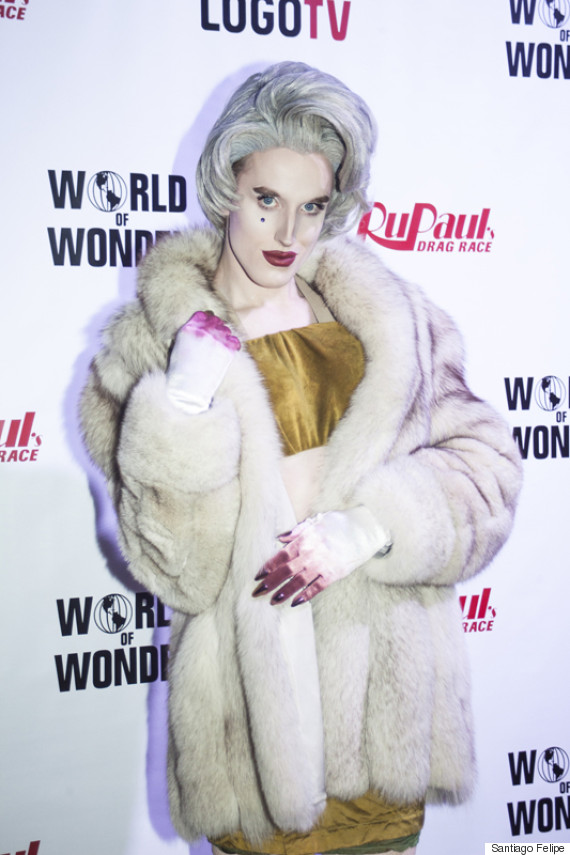
“I know that, although drag has gotten a lot more mainstream in the American media’s eyes and in a lot of other countries that have a bit more freedom speech, press media and self-expression — it’s definitely mainstream. But there is always room for growth and there is already room to expand peoples’ minds. I’m proud to be a part of the empire that is continuing to grow in terms of drag and the LGBT community and over-the-top self-expression. It’s all the rage and I don’t think it’s going to die down anytime soon.”
Ginger Minj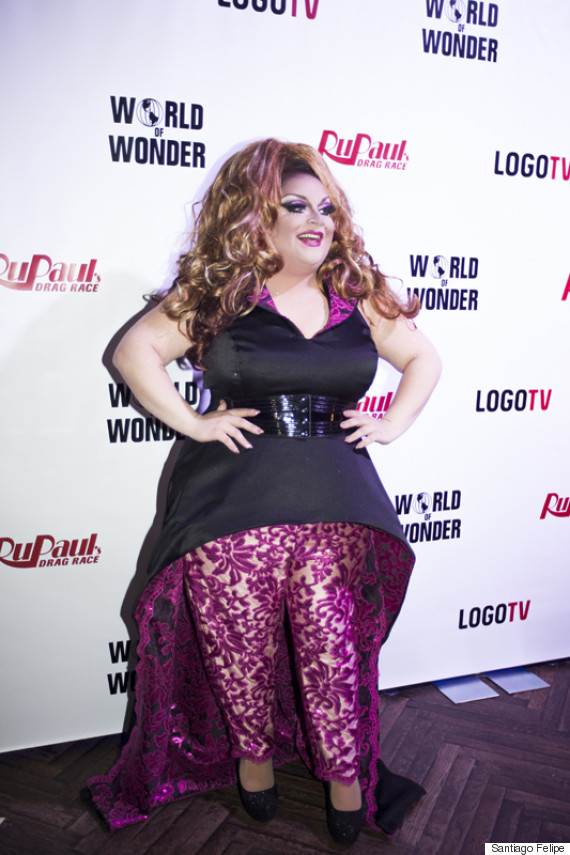
“I think with anything, once you start to go more mainstream there’s certain things that get taken for granted. Once you make steps of progress it’s hard to go back and say “no, no no, this is still serious. We’re still delivering the same message we were twenty years ago.” It changes. But I also think it is important that we are going so mainstream. I’m the show director of Hamburger Mary’s Orlando and 90% of our clientele are straight families with children… I think that because RuPaul has been knocking down so many walls and barriers, it is safe and comfortable and not scary for children and families to come in and experience drag.”
Jasmine Masters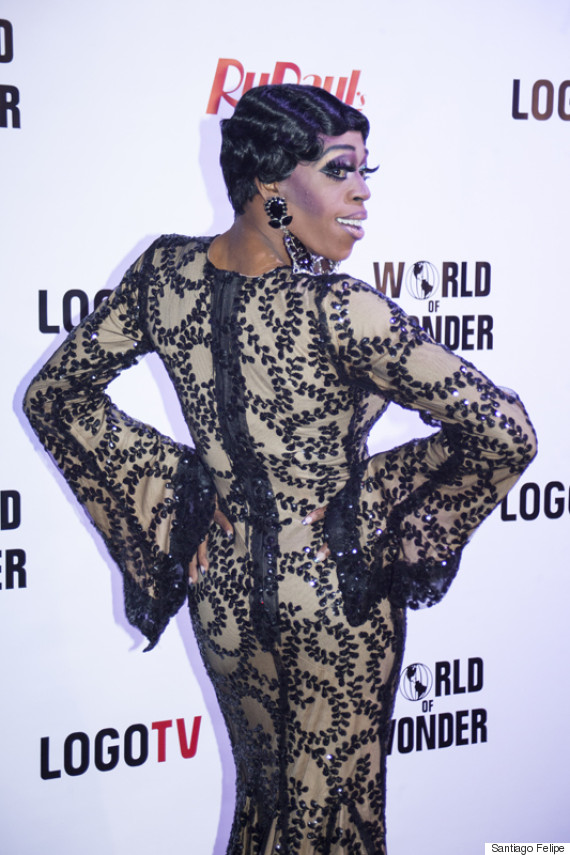
“Drag has changed over the years because people are starting to recognize it as a job and as an art -– not just guys who want to dress up or be women. They’re really seeing the craft or the art of it. It really shines a good light onto the world because [people are seeing] drag as something besides what they see in their minds. Not every drag queen wants to be a woman… and I think the world has gotten a good glimpse of that now.”
Kasha Davis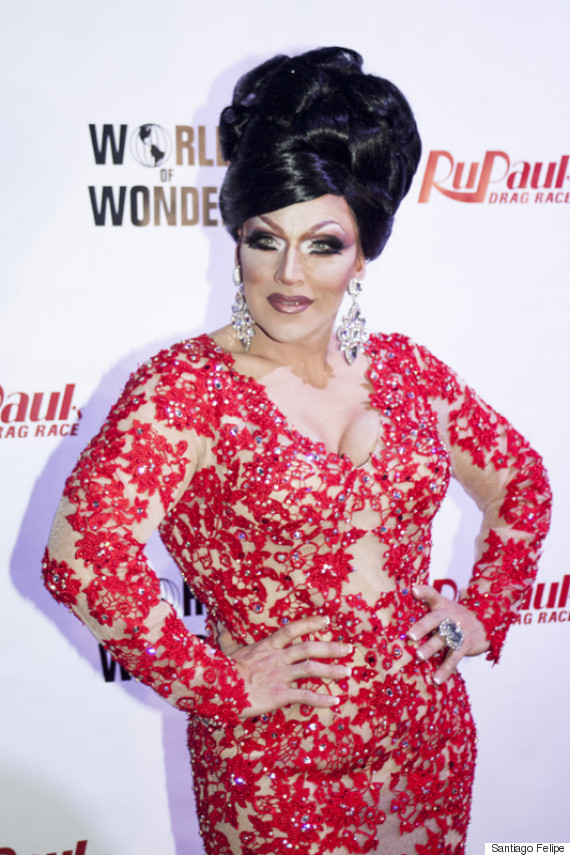
“The great thing about drag is that you can do pretty much anything. Everybody’s got their favorite type of drag and there are some people who like to push the lines and do that type of thing. And then there’s other old-school, seasoned gals like myself who like to bring you a little Liza Minnelli and Tina Turner.”
Lady Bunny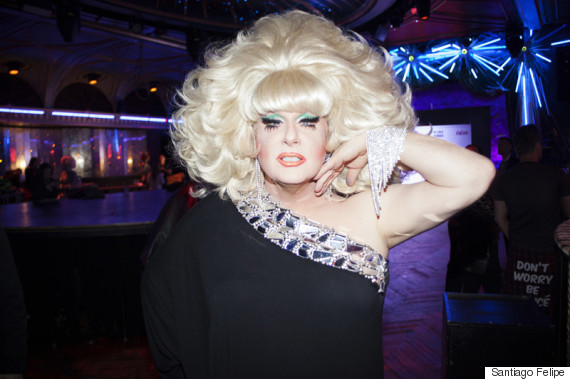
“Drag does have the potential [to be subversive or political] but that’s not what anyone is looking for from ‘Drag Race.’ Sharon Needles was a bit political, a vegetarian, outspoken on a variety of issues, more evolved, enlightened thinking, but this is basically about runway and attitude. So I don’t think there’s much politics. I also think that when I was growing up in the ‘70s and even in the ‘80s, drag was something that gay men went to see in gay bars. So just the very fact that gay people could not be out of the closet, it was very freeing for gay men to go into a club and say, “Wow! There’s someone that’s not only not afraid to be gay, but they’re walking around as a transsexual.” So I think for my generation drag was a very “F YOU” to the conventions that kept us in the closet. But now we’re not longer in the closet and drag is on TV, so just doing drag in itself is not subversive at all anymore. It could be! I’m very interested in politics, but at the age of these queens I wouldn’t even like your political post on Facebook! Especially if it had nothing to do with gay rights. But this show isn’t political in any way.”
“RuPaul’s Drag Race” will air on Logo on Monday, March 2 at 9 p.m. ET/PT. Visit Logo’s official site for more info. Head here for the full list of queens and check out more photos from the NYC premiere below.
Bill Promoting Psychological Abuse of LGBT Children Moves Forward in Oklahoma
Bill Promoting Psychological Abuse of LGBT Children Moves Forward in Oklahoma

Today an extreme anti-LGBT Oklahoma bill seeking to legitimize the dangerous and discredited practice of so-called “conversion therapy” passed the Oklahoma House Committee.
HRC.org
